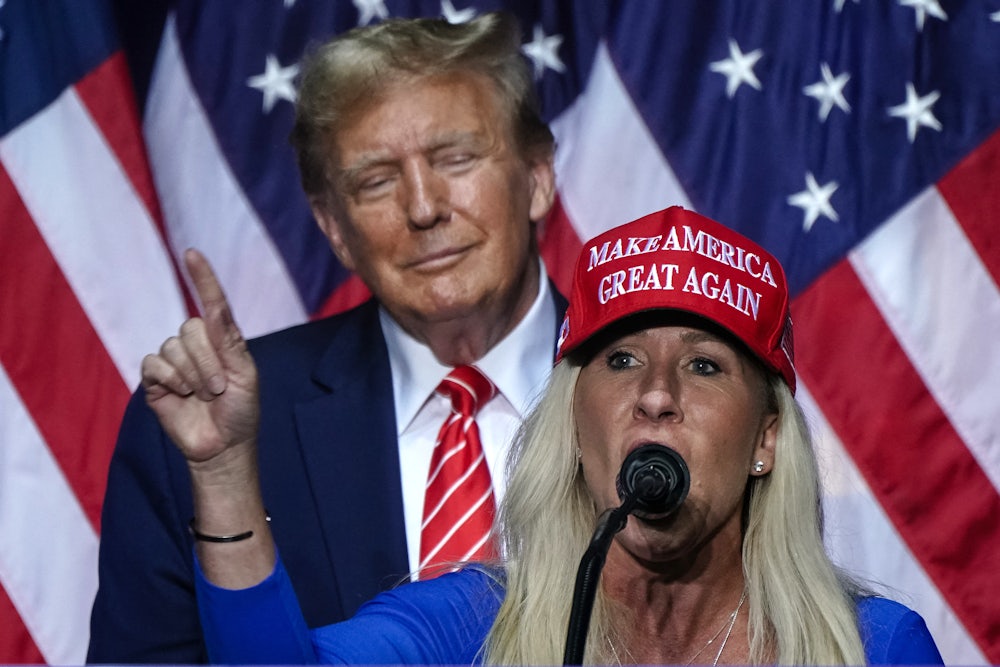The last two months have been a coronation for House Speaker Mike Johnson. When he first won the gavel in late October, the general consensus was that the backbench Republican would struggle to hold onto power. Inexperienced and commanding a razor-thin majority—one that has subsequently shrunk—he was at the mercy of a cabal of nihilistic bomb-throwers on his right flank. Surely, before too long, Johnson would slip up and the radicals would claim another scalp.
Johnson has, against all odds, not only held onto his speakership but stared down—and beaten—the extremists repeatedly in recent months. In March, he passed a government funding bill with minimal support from his own party—the exact maneuver that ultimately cost his predecessor, Kevin McCarthy, the gavel. In late April, he passed a $95 billion aid bill for Ukraine, Israel, and Taiwan that had been stalled for months amid fierce resistance from Donald Trump and his allies in the House. And this week, he easily survived a motion to vacate brought by Marjorie Taylor Greene, the Queen of the House Crazies. He has done all three of these things with significant Democratic support—and largely with the backing of Trump as well. He will almost unquestionably finish this congressional term as speaker of the House, a feat in and of itself, and something that seemed impossible only six months ago.
This is a triumphant moment for Johnson. Some also see it as a moment to go on the offensive and clean up a Republican Party—and larger incentive structure in both politics and media—that has coddled unserious and destructive figures like Greene and her fellow Floridian Matt Gaetz who led the coup against McCarthy. Writing in Politico, former GOP strategist Brendan Buck argued on Wednesday that this is the moment to disempower extremists, to return to a political culture that emphasizes the attainable, and to, well, make politics normal again. “Even behind closed doors, few words are devoted to what can reasonably be attained,” Buck writes. “Everything must be grounded in a fight for the maximalist position. And whenever conservatives foil a more realistic plan, they do so with impunity.… If the hard-liners don’t like it, there is an alternative: act like a majority and back your speaker.” Subsequent reporting from Politico seemed to suggest that a possible sea change was afoot: After Greene’s failed motion to vacate, she was left “with next to no allies in the House.”
Unfortunately, Marjorie Taylor Greene isn’t going anywhere. It would be wonderful to change the political, financial, and media incentive structures that have pushed the Republican Party to the right over the last several decades, but those have grown stronger in recent years while the party itself has grown much weaker. Unless the whole incentive structure of Republican politics changes—and it won’t as long as Trump is in charge (and probably not after either!)—you will keep getting Marjorie Taylor Greenes and Matt Gaetzes. You will also keep getting more extreme Republican leaders, like Johnson himself.
The biggest reason why Greene won’t go away is that she still has the backing of Donald Trump, by far the most important figure in Republican politics today. “I absolutely love Marjorie Taylor Greene,” Trump wrote on his bespoke social network Truth Social shortly after her motion to vacate failed. “She’s got Spirit, she’s got Fight, and I believe she’ll be around, and on our side, for a long time to come. However, right now, Republicans have to be fighting the Radical Left Democrats, and all the Damage they have done to our Country.”
It’s a revealing post. Trump is not really trying to chasten Greene, let alone excommunicate her. Right now, he and his allies have—for arguably the first time in Trump’s political career—decided that intraparty dysfunction hurts his political chances and therefore must be avoided. That’s why Trump has backed Johnson. It’s also why his criticism of Johnson’s decision to pass the aid bill for Ukraine (and Israel and Taiwan) was, by his standards at least, relatively muted. But once the election ends, Trump has little reason to play nice with his fellow Republicans, and every reason to go back to his old method of doing things, which is rewarding members of his party only for their blind loyalty.
Trump has become the figurehead, and near dictator, of the Republican Party by adopting Greene-like tactics. He is openly extreme and contemptuous of compromise of any kind. For all the talk of his novelty, this strand of Republican politics predates him. It should be familiar to anyone who has watched Fox News over the last three decades or who has heard the term “RINO”: Republican in Name Only. You don’t gain success in the GOP by meeting in the middle or working across the aisle. You do so by insisting that total victory is not only possible but existentially important—and that anyone who thinks or acts differently should be jettisoned from the party.
Johnson has, to be fair, had surprising success bucking the extreme wings of his party. But that has largely been a necessity: He had to find a way to keep the government open and did. Packaging aid to Israel with aid to Ukraine was the only way that it would pass both chambers of Congress. But Johnson is hardly a sign that the party is moderating: He is, himself, rather openly extremist, someone with reactionary views about abortion, gay rights, and the separation of church and state (or lack thereof). If you are looking for someone to fight for the middle in American politics, it is not Mike Johnson.
It is possible that once Trump’s grip on the party loosens—which may happen if he loses in November, though I’m not holding my breath—this will shift. At the very least, the absence of Trump would likely mean less overt chaos, given his own predilection for stirring the pot. But the overall arc of the Republican Party, and the incentive structure that rewards extremism, will not change. Greene, like Trump, isn’t an exception. They are the product of a deeply perverse and corrupting set of incentives that have only grown stronger over the last decade.








